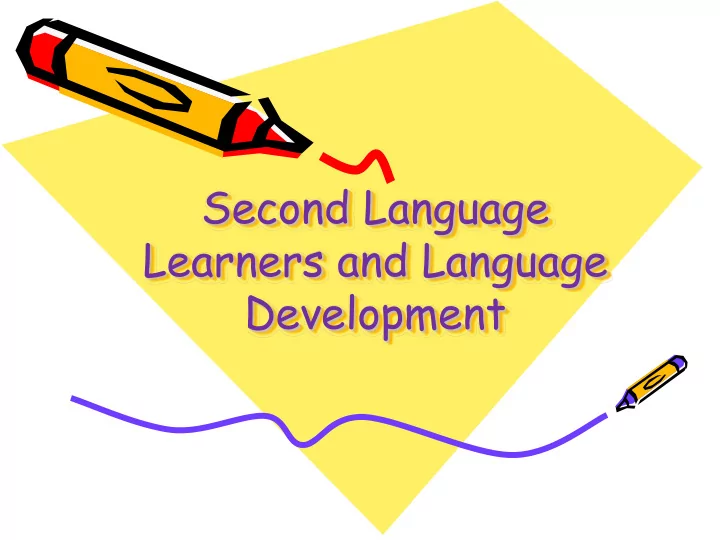

Second Language Learners and Language Development
How long does it take to learn a second language? • According to research: 5 to 7 years • Factors affecting language learning: – Emotional variables – Self-esteem – Motivation – Attitudes – Age – Parents can foster a spirit of mutual respect, high expectations, and cooperative learning.
How long does it take to learn a second language? • Basic Interpersonal Communication Skills – 2 to 3 years – Ability to converse and understand every day discussions • Cognitive Academic Language Proficiency – 5 to 7 years – Ability to read, write, speak, and listen at an academic level
Stages of second language acquisition • Preproduction/Comprehension Stage • Early Production • Speech Emergence • Intermediate Fluency • Advanced Fluency
What Literacy Skills Transfer? • Directionality • Sequencing • Ability to distinguish shapes and sounds • Knowledge that written symbols correspond to sounds and can be decoded in order and direction • Activation of semantic and syntactic knowledge • Knowledge of text structure • Learning to use cues to predict meaning • Awareness of the variety of purposes for reading and writing • Confidence in oneself as a reader and writer
First and second language learners Characteristics Primary Second language language speaker speaker Constructs language from prior conceptual x x knowledge Uses cognitive strategies x x Makes developmental errors x x Experiences a silent period x x Develops language in predictable stages x x Generally has a greater knowledge of the world x Generally can learn and apply rules more easily x Has primary language as a resource x Is familiar with more than one culture x
Will my child get confused if we speak one language at home and he learns a different one at school? • No, young children have the potential of learning more than one language
Learning a second language requires time, persistence, and creativity • Parents can help by finding or creating activities to help learn that new language: – Watching movies – Reading books – Talking with friends – Etc. (See handout for other ideas)
Learning a second language is not an easy task
The Five Components of Language Phonology Pragmatics Morphology Language Semantics Syntax
Pedagogical factors affecting language development • Acquisition v. Learning – Teaching the rules of grammar does not facilitate acquisition. – Acquisition is unconscious; learning is conscious. – Children need time (silent period) to internalize language. • Natural Order – Certain rules of language tend to be acquired before others. – This natural order is best acquired in normal conversation rather than by direct grammar instruction. • Monitor – Acquisition is responsible for fluency – Learning serves to develop a Monitor (editor) to detect errors. – Explicit correction rarely changes students’ writing or speaking behavior. • Input – Comprehensible input – We acquire language when we understand the message. – Making instruction relevant and meaningful, using frequent comprehension checks, and using cooperative learning activities help. – Exposure to language helps to learn the language.
Frequently asked questions • Is it okay to read books to my child in my native language? • If I only read to my child in my native language will he ever learn to read in the other language? • Other questions?
Recommend
More recommend